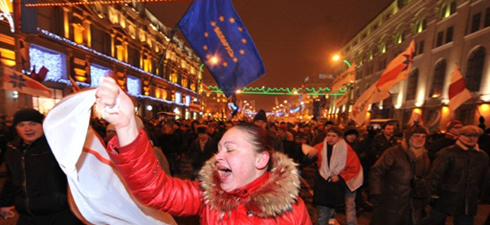And so once again a Belarusian presidential election has become a problem for the West. The beating of the incumbent’s rivals by the police, clubbing of anti-government protesters, arrests of opposition leaders – all that is hardly doing anything to encourage an opening towards Lukashenko’s Belarus. Rather, it looks like a return to those grim times when Alexander Lukashenko was called the “last dictator in Europe”.
The results of the Sunday ballot (79.67% for the incumbent) are being called into question in Minsk, with opposition sources estimating Lukashenko’s score at half of that reported by government-commissioned exit polls. So what should be our reaction to the official results? Should we reintroduce sanctions against the Belarusian regime, again ban their officials from visiting the West, cut Lukashenko off from the Alpine slopes and get-togethers with Berlusconi? It is easier to say what should be our reaction to the beating of opposition candidate Vladimir Neklyayev – sharp criticism and indignation.
We should not, however, be making hasty emotional decisions. I am not suggesting we should pretend nothing has happened. A lot has happened and we should say this out loud. Explanations have to be demanded about vote counting and police attacks on opposition leaders.
Belarus isn’t an easy partner for anyone
The West must not, however, vacillate between sanctions and promises, threaten the regime with a stick one day and offer the carrot on another. Did those offering a bunch of carrots before the elections really expect them to observe democratic standards? Did they expect, for instance, the poll station officials’ mentality to change overnight?
Belarus is not the only country east of the EU where election results are, to put it mildly, open to doubt. And the West sees nothing wrong in talking to the other regional leaders and doing business with them. There is a certain country east of the EU where the police attacks an 82-year-old lady (Ludmila Alekseyeva, Russian opposition figure -ed) and this doesn’t cause any deterioration in its relations with the West.
Mr Lukashenko has many sins on his conscience and one day his own people will probably force him to account for them. But under his reign, Belarus has strengthened its sovereignty. This isn’t an easy partner for anyone. And that isn’t going to change.
The West should seriously consider whether to turn its back on Lukashenko. And it certainly shouldn’t be turning its back on the Belarusians. Belarus hasn’t been irrevocably lost for the Western world yet.
From Moscow
Victory, with some help from Europe and Russia
“Alexander Lukashenko’s main battle has been fought and won in the field of foreign affairs,” remarks Gazeta.ru. “But just three or four months ago, few would have predicted such a victory.” At that time, “the West was demanding that he liberalise his internal policy and Russia was undermining the country’s economy.” But as the Russian news website explains, “instead of facing a rain of threats, Belarus became the object of intense courtship,” with Russia and the EU vying to become its favoured partner. “European leaders traveled to Minsk bearing offers of cooperation. At the same time, Russia resumed deliveries of untaxed petrol in exchange for Belarusian agreement to create a unified economic space. In Europe, the figure cited for aid to Belarus was three billion euros, while in Moscow the cost of measures in support of the country was evaluated at two billion dollars per year.”
“Lukashenko’s successful demonstration of a capacity to build ties with Europe effectively forced the Kremlin to devote considerable resources to the task of recovering its strategic ally,” remarks Gazeta.ru. “The situation in Europe is much simpler. The Europeans are more interested in processes than results, and the processes that they want to see can be launched with Lukashenko as head of state. In fact, this is already happening.”
Do you like our work?
Help multilingual European journalism to thrive, without ads or paywalls. Your one-off or regular support will keep our newsroom independent. Thank you!
















